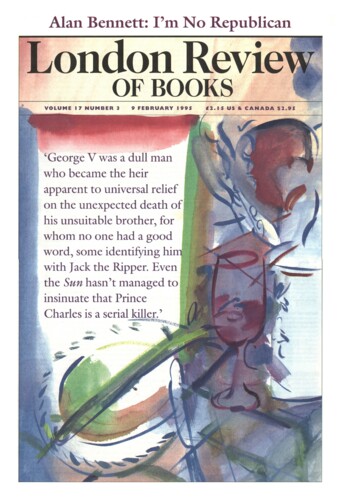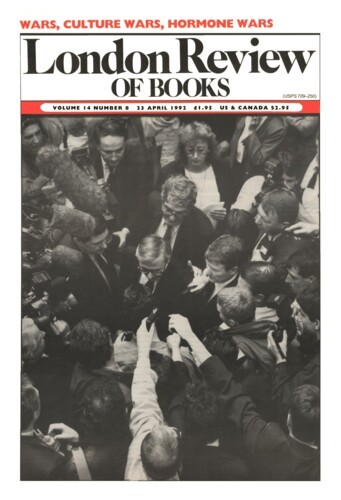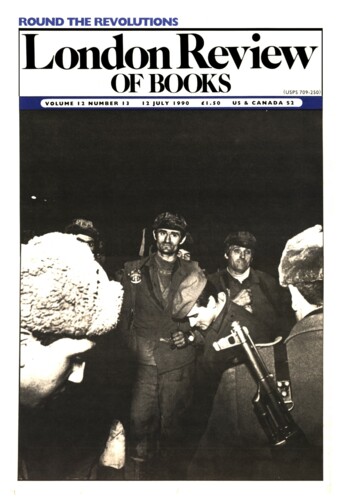T.H. Barrett
T.H. Barrett teaches in the Department of the Study of Religions at the School of Oriental and African Studies in London. He is the author of Taoism under the T’ang.
What the Japanese are saying
T.H. Barrett, 10 March 1994
Christchurch, New Zealand looks rather a long way away on most maps – somewhere in the bottom right-hand corner, usually – but one can tell, even from London, that the intellectual atmosphere at the University of Canterbury must be something very special, at least in historical studies. Somehow, whether because it perceives itself to be perched on the far edge of European expansion, or perhaps thanks to the comparative lack of distraction from archives in the immediate vicinity, its history department seems always to have encouraged a certain breadth of vision rare in other centres: one thinks, for example, of J.J. Saunders and his writings on the Mongol Empire and its place in world history. This intellectual legacy has been taken up with a vengeance by S.A.M. Adshead, by origin a historian of late imperial China, in recent works such as China in World History and Salt and Civilisation. His latest offering, on Central Asia, wastes no time on its opening page sorting out just what world history is for his purposes – namely, something which came into being circa 1200, the date of ‘what Joseph Fletcher (1934-84), the greatest modern Central Asianist, called the “interlocking of histories”’. This all looks very promising: Joseph Fletcher certainly was the greatest. But since early death robbed him of the chance of ever producing a book of his own, his ideas live on mainly as refracted through other people’s perceptions of what he had to say in his widely scattered writings. The next mention of Fletcher a few pages later suggests that all is not well with this particular attempt to build on the master’s legacy. Here, and throughout Adshead’s book, he is credited with the ‘theory of blood tanistry (from the Celtic word meaning “succession”)’, but what Fletcher wrote was ‘bloody tanistry’, to signify not simply consanguinity (already implied by the word ‘tanistry’) but also the succession of the fittest, which in the harsh conditions of the steppes, and even in some states with nomad origins like the early Ottoman Empire, meant specifically the succession of the most bloody, bold and resolute. This was usually achieved by the Central Asian tanist wiping out all his brothers, and possibly a few other male kinsmen as well, though occasionally a kind-hearted parent (such as Selim, father of Suleiman the Magnificent) would anticipate matters by murdering all his male offspring but one.’
More famous than Madonna
T.H. Barrett, 23 April 1992
What does it take to make a Medieval non-European of no particular personal charm as much a household name as Madonna? Could it be the teenage murder of a half-brother, the abandonment of his young wife to his enemies to save his skin, the execution of his closest friend, a blood-brother since childhood, by dismemberment, and (in all probability) the poisoning of his eldest son as well? This all sounds much more like Renaissance Italy than the everyday life of ordinary steppe-dwelling folk, whose humdrum existence has not generally been highly regarded by European civilisation. But is it enough to explain the success of Genghis Khan in founding the largest land-based empire in history?
From the Urals to the Himalayas
T.H. Barrett, 12 July 1990
One wonders what Lord Acton would have made of this slim, undersized volume claiming the name of Cambridge History. A part of the world that has given us Tamerlane, Genghis Khan and Attila the Hun can hardly be dismissed as unimportant, but it must be said that little of world-shaking significance has happened there lately, although there are signs that this may now be changing. The most famous Inner Asian of our own times was probably Irving Berlin, and he left at a very early age. Where the Golden Horde has yielded to Alexander’s Ragtime Band why bother about so long ago, so very far away? Of course, such complacency may be premature. The late 20th century turns out to be full of the most unlikely surprises: in his introductory discussion of the concept of Inner Asia Denis Sinor laments the total disappearance of the useful concept of Central Europe, but while his piece has been in the press up it has popped again.
Closed Windows
T.H. Barrett, 11 January 1990
At the dawn of our cultural traditions lie accounts of men alone among strangers who, by luck or guile, triumph even though uprooted from their own societies: men such as Joseph or Odysseus. The fascination of this theme seems as strong as ever, perhaps affecting our curiosity about Robert Maxwell, as well as our taste for the works of Thubron or Theroux. But today, when jumbo jets deposit increasing numbers of ordinary people in the middle of totally unfamiliar cultures which are now only a few flying hours away, it may be time to start reflecting on a very different type of tale. John Hu, the Hu in Jonathan Spence’s latest book, was a man without guile, and without luck. He travelled to France from Canton in 1722 as the employee of Jean-François Foucquet, a Jesuit missionary, but behaved in such a bizarre fashion that in 1723 he was committed to an asylum. In 1726 he was shipped back home alone; meanwhile Foucquet had distanced himself both from his Chinese assistant and from his own missionary colleagues, and had become a bishop in Rome.
Read anywhere with the London Review of Books app, available now from the App Store for Apple devices, Google Play for Android devices and Amazon for your Kindle Fire.
Sign up to our newsletter
For highlights from the latest issue, our archive and the blog, as well as news, events and exclusive promotions.





